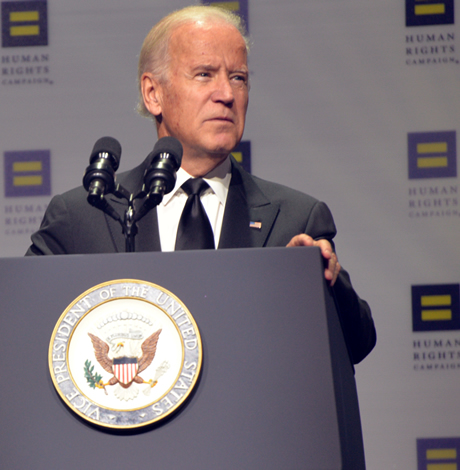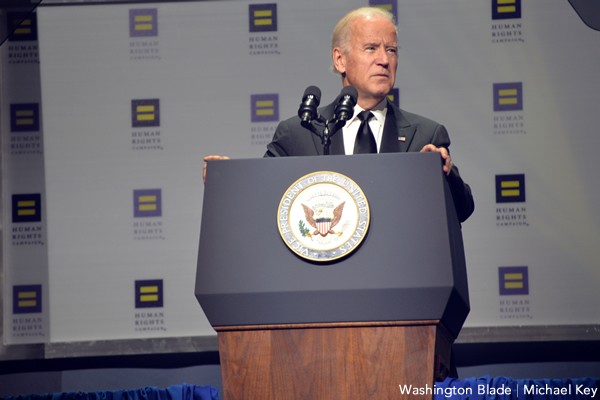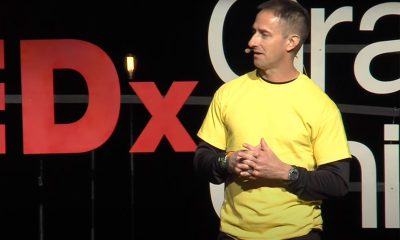News
Biden Foundation sets up advisory councils for women, LGBT rights
Initiative launched amid speculation of 2020 run


Former Vice President Joe Biden</strong> has created advisory councils for women and LGBT rights.
(Washington Blade file photo by Michael Key)
Former Vice President Joseph Biden, among the potential Democratic candidates for the 2020 presidential election, announced on Monday the creation of two new advisory councils for his foundation: One to advance LGBT rights, the other to end violence against women.
Members of both councils are made up of prominent advocates on women’s and LGBT issues, many of whom are supporters of the Democratic Party.
Individuals named to the LGBTQ Equality Advisory Council include singer Cyndi Lauper, former NBA player Jason Collins, transgender activist Sarah McBride, Judy Shepard, marriage equality advocate Evan Wolfson and former U.S. ambassador to Romania Michael Guest.
Biden said in a statement members of the councils “have devoted their lives to that creed, and we’re lucky to have them lend their expertise to this mission.”
“By working together, we can do more to protect the rights of all people, expand access to opportunity and give every American a chance at a middle-class life,” Biden said. “I am eager for what we will accomplish together.”
According to a statement from the Biden Foundation, the advisory councils will recognize the power of public-private initiatives, serve as ambassadors for the Biden Foundation and guide strategic partnerships to create societal change.
Louisa Terrell, executive director of the Biden Foundation, said in a statement each council member “has made it their life’s work to protect and advance the rights of the most vulnerable.”
“We’re honored to have them volunteer their knowledge to the Foundation as we work together to build a more just society,” Terrell added.
Biden has a record of highlighting the issue of violence against women. As a U.S. senator, he was author of the Violence Against Women Act, a law that was reauthorized in 2013 when he was vice president to include LGBT-specific protections.
On LGBT issues, Biden was also at the forefront. The vice president famously came out for same-sex marriage days before former President Obama and called transgender issues the “civil rights issue of our time” and was active in championing international LGBT human rights.
Lauper, co-founder of the True Colors Fund, highlighted the issue of LGBT youth homelessness in a statement on her membership of the LGBT council.
“In America, up to 1.6 million youth experience homelessness each year. 40 percent of them identify as LGBTQ, compared to the seven percent of the general youth population that is LGBTQ. The True Colors Fund is working hard to change that,” Lauper said. “As a lifelong ally and advocate, Vice President Biden gets it — and today, I’m proud to join the Biden Foundation as we work to make equality a reality.”
The full roster of both advisory councils follows.
LGBTQ Equality Advisory Council
Cyndi Lauper, Singer, Songwriter, Actress, Activist; Founder, True Colors Fund
Sara Ramírez, Tony Award–winning Actress and Activist
Jason Collins, Professional Basketball Player (retired), National Basketball Association
Sarah McBride, National Press Secretary, Human Rights Campaign
Phillip Picardi, Chief Content Officer, Them and Teen Vogue
Judy Shepard, President, Matthew Shepard Foundation
Evan Wolfson, Founder and Former President, Freedom to Marry
Marsha Aizumi, Author, Speaker, Educator, Advocate Member, PFLAG National Board of Directors
Dr. Eliza Byard, Executive Director, Gay, Lesbian, and Straight Education Network
Ambassador Michael Guest, Former U.S. Ambassador to Romania
Mara Keisling, Founder and Executive director, National Center for Transgender Equality
Dr. Caitlin Ryan, Director and Co-Founder, Family Acceptance Project
Rev. Jasmine Beach-Ferrara, Founding Executive Director, Campaign for Southern Equality; Minister, United Church of Christ
Jacob Tobia, Writer, Producer, Author
Amit Paley, Chief Executive Officer and Executive Director, Trevor Project Precious Davis, Activist, Educator, Public Speaker
Ending Violence Against Women Advisory Council
Justin Baldoni, Actor, filmmaker and activist
Karma Cottman, Founder, Ujima: The National Center on Violence Against Black Women; Executive Director, DC Coalition Against Domestic Violence
Jess Davidson, Managing Director, End Rape on Campus
Venkayla Haynes, Regional Advisor, It’s On Us
Rosie Hidalgo, Senior Director of Policy, Casa de Esperanza; Senior Advisor, National Resource Center on Domestic Violence
Olivia Hinerfeld, Activist
Vivian Huelgo, Chief Counsel, Task Force on Human Trafficking and Commission on Domestic & Sexual Violence of the American Bar Association
Neil Irvin, Executive Director, Men Can Stop Rape
Demetra Lambros, Appellate attorney, U.S. Department of Justice
Zerlina Maxwell, Director of Progressive Programming, SiriusXM
Victoria Nourse, Professor, Georgetown Law School
Nancy Schwartzman, Director, Producer, Mobile App Developer; CEO, Tech 4 Good
Patti Seger, Executive Director, End Domestic Abuse Wisconsin
Susan Sorenson, Professor, University of Pennsylvania
Andrew Sta. Ana, Director of Legal Services, Day One
Ebony Tucker, Advocacy Director, National Alliance to End Sexual Violence
New York
Two teens shot steps from Stonewall Inn after NYC Pride parade
One of the victims remains in critical condition

On Sunday night, following the annual NYC Pride March, two girls were shot in Sheridan Square, feet away from the historic Stonewall Inn.
According to an NYPD report, the two girls, aged 16 and 17, were shot around 10:15 p.m. as Pride festivities began to wind down. The 16-year-old was struck in the head and, according to police sources, is said to be in critical condition, while the 17-year-old was said to be in stable condition.
The Washington Blade confirmed with the NYPD the details from the police reports and learned no arrests had been made as of noon Monday.
The shooting took place in the Greenwich Village neighborhood of Manhattan, mere feet away from the most famous gay bar in the city — if not the world — the Stonewall Inn. Earlier that day, hundreds of thousands of people marched down Christopher Street to celebrate 55 years of LGBTQ people standing up for their rights.
In June 1969, after police raided the Stonewall Inn, members of the LGBTQ community pushed back, sparking what became known as the Stonewall riots. Over the course of two days, LGBTQ New Yorkers protested the discriminatory policing of queer spaces across the city and mobilized to speak out — and throw bottles if need be — at officers attempting to suppress their existence.
The following year, LGBTQ people returned to the Stonewall Inn and marched through the same streets where queer New Yorkers had been arrested, marking the first “Gay Pride March” in history and declaring that LGBTQ people were not going anywhere.
New York State Assemblywoman Deborah Glick, whose district includes Greenwich Village, took to social media to comment on the shooting.
“After decades of peaceful Pride celebrations — this year gun fire and two people shot near the Stonewall Inn is a reminder that gun violence is everywhere,” the lesbian lawmaker said on X. “Guns are a problem despite the NRA BS.”
India
Anaya Bangar challenges ban on trans women in female cricket teams
Former Indian cricketer Sanjay Bangar’s daughter has received support

Anaya Bangar, the daughter of former Indian cricketer Sanjay Bangar, has partnered with the Manchester Metropolitan University Institute of Sport in the U.K. to assess her physiological profile following her gender-affirming surgery and undergoing hormone replacement therapy.
From January to March 2025, the 23-year-old underwent an eight-week research project that measured her glucose levels, oxygen uptake, muscle mass, strength, and endurance after extensive training.
The results, shared via Instagram, revealed her metrics align with those of cisgender female athletes, positioning her as eligible for women’s cricket under current scientific standards. Bangar’s findings challenge the International Cricket Council’s 2023 ban on transgender athletes in women’s cricket, prompting her to call for a science-based dialogue with the Board of Control for Cricket in India and the ICC to reform policies for transgender inclusion.
“I am talking with scientific evidence in my hand,” Bangar said in an interview posted to her Instagram page. “So, I hope, this makes an impact and I will be hoping to BCCI and ICC talking with me and discussing this further.”
On Nov. 21, 2023, the ICC enacted a controversial policy barring trans women from international women’s cricket. Finalized after a board meeting in Ahmedabad, India, the regulation prohibits any trans player who has experienced male puberty from competing, irrespective of gender-affirming surgery or hormone therapy. Developed through a 9-month consultation led by the ICC’s Medical Advisory Committee, the rule aims to safeguard the “integrity, safety, and fairness” of women’s cricket but has drawn criticism for excluding athletes like Canada’s Danielle McGahey, the first trans woman to play internationally. The policy, which allows domestic boards to set their own rules, is slated for review by November 2025.
Bangar shared a document on social media verifying her participation in a physiological study at the Manchester Metropolitan University Institute of Sport, conducted from Jan. 20 to March 3, 2025, focused on cricket performance. The report confirmed that her vital metrics — including haemoglobin, blood glucose, peak power, and mean power — aligned with those of cisgender female athletes. Initially, her fasting blood glucose measured 6.1 mmol/L, slightly above the typical non-diabetic range of 4.0–5.9 mmol/L, but subsequent tests showed it normalized, reinforcing the study’s findings that her physical profile meets female athletic standards.
“I am submitting this to the BCCI and ICC, with full transparency and hope,” said Bangar. “My only intention is to start a conversation based on facts not fear. To build space, not divide it.”
In a letter to the BCCI and the ICC, Bangar emphasized her test results from the Manchester Metropolitan University study. She explained that the research aimed to assess how hormone therapy had influenced her strength, stamina, haemoglobin, glucose levels, and overall performance, benchmarked directly against cisgender female athletic standards.
Bangar’s letter to the BCCI and the ICC clarified the Manchester study was not intended as a political statement but as a catalyst for a science-driven dialogue on fairness and inclusion in cricket. She emphasized the importance of prioritizing empirical data over assumptions to shape equitable policies for trans athletes in the sport.
Bangar urged the BCCI, the world’s most influential cricket authority, to initiate a formal dialogue on trans women’s inclusion in women’s cricket, rooted in medical science, performance metrics, and ethical fairness. She called for the exploration of eligibility pathways based on sport-specific criteria, such as haemoglobin thresholds, testosterone suppression timelines, and standardized performance testing. Additionally, she advocated for collaboration with experts, athletes, and legal advisors to develop policies that balance inclusivity with competitive integrity.
“I am releasing my report and story publicly not for sympathy, but for truth. Because inclusion does not mean ignoring fairness, it means measuring it, transparently and responsibly,” said Bangar in a letter to the BCCI. “I would deeply appreciate the opportunity to meet with you or a representative of the BCCI or ICC to present my findings, discuss possible policy pathways, and work towards a future where every athlete is evaluated based on real data, not outdated perceptions.”
Before her transition, Bangar competed for Islam Gymkhana in Mumbai and Hinckley Cricket Club in the U.K., showcasing her talent in domestic cricket circuits. Her father, Sanjay Bangar, was a dependable all-rounder for the Indian national cricket team from 2001 to 2004, playing 12 test matches and 15 One Day Internationals. He later served as a batting coach for the Indian team from 2014 to 2019, contributing to its strategic development.
Cricket in India is a cultural phenomenon, commanding a fanbase of more than 1 billion, with more than 80 percent of global cricket viewership originating from the country.
The International Cricket Council, the sport’s governing body, oversees 12 full member nations and more than 90 associate members, with the U.S. recently gaining associate member status in 2019 and co-hosting the 2024 ICC Men’s T20 World Cup. The BCCI generated approximately $2.25 billion in revenue in the 2023–24 financial year, primarily from the Indian Premier League, bilateral series, and ICC revenue sharing. The ICC earns over $3 billion from media rights in India alone for the 2024–27 cycle, contributing nearly 90 percent of its global media rights revenue, with the BCCI receiving 38.5 percent of the ICC’s annual earnings, approximately $231 million per year.
Women’s cricket in India enjoys a growing fanbase, with over 300 million viewers for the Women’s Premier League in 2024, making it a significant driver of the sport’s global popularity. The International Cricket Council oversees women’s cricket in 12 full member nations and over 90 associate members, with the U.S. fielding a women’s team since gaining associate status in 2019 and competing in ICC events like the 2024 Women’s T20 World Cup qualifiers. The BCCI invests heavily in women’s cricket, allocating approximately $60 million annually to the WPL and domestic programs in 2024–25, while contributing to the ICC’s $20 million budget for women’s cricket development globally. India’s media market for women’s cricket, including WPL broadcasting rights, generated $120 million in 2024, accounting for over 50 percent of the ICC’s women’s cricket media revenue.
“As a woman, I feel when someone says that they are women, then they are, be trans or cis. A trans woman is definitely the same as a cis woman emotionally and in vitals, and specially, when someone is on hormone replacement therapy. Stopping Anaya Bangar from playing is discrimination and violation of her rights. It is really sad and painful that every transwoman need to fight and prove their identity everywhere,” said Indrani Chakraborty, an LGBTQ rights activist and a mother of a trans woman. “If ICC and BCCI is stopping her from playing for being transgender, then I will say this to be their lack of awareness and of course the social mindsets which deny acceptance.”
Chakraborty told the Blade that Bangar is an asset, no matter what. She said that the women’s cricket team will only benefit by participation, but the discriminating policies are the hindrance.
“Actually the transgender community face such discrimination in every sphere. In spite of being potent, they face rejection. This is highly inhuman. These attitudes is regressive and will never let to prosper. Are we really in 2025?,” said Chakraborty. “We, our mindset and the society are the issues. We, as a whole, need to get aware and have to come together for getting justice for Anaya. If today, we remain silent, the entire community will be oppressed. Proper knowledge of gender issues need to be understood.”
The BCCI and the International Cricket Council have not responded to the Blade’s repeated requests for comment.
New York
Zohran Mamdani participates in NYC Pride parade
Mayoral candidate has detailed LGBTQ rights platform

Zohran Mamdani, the candidate for mayor of New York City who pulled a surprise victory in the primary contest last week, walked in the city’s Pride parade on Sunday.
The Democratic Socialist and New York State Assembly member published photos on social media with New York Attorney General Letitia James, telling followers it was “a joy to march in NYC Pride with the people’s champ” and to “see so many friends on this gorgeous day.”
“Happy Pride NYC,” he wrote, adding a rainbow emoji.
Mamdani’s platform includes a detailed plan for LGBTQ people who “across the United States are facing an increasingly hostile political environment.”
His campaign website explains: “New York City must be a refuge for LGBTQIA+ people, but private institutions in our own city have already started capitulating to Trump’s assault on trans rights.
“Meanwhile, the cost of living crisis confronting working class people across the city hits the LGBTQIA+ community particularly hard, with higher rates of unemployment and homelessness than the rest of the city.”
“The Mamdani administration will protect LGBTQIA+ New Yorkers by expanding and protecting gender-affirming care citywide, making NYC an LGBTQIA+ sanctuary city, and creating the Office of LGBTQIA+ Affairs.”
-

 U.S. Supreme Court3 days ago
U.S. Supreme Court3 days agoSupreme Court upholds ACA rule that makes PrEP, other preventative care free
-

 U.S. Supreme Court3 days ago
U.S. Supreme Court3 days agoSupreme Court rules parents must have option to opt children out of LGBTQ-specific lessons
-

 India5 days ago
India5 days agoIndian court rules a transgender woman is a woman
-

 National4 days ago
National4 days agoEvan Wolfson on the 10-year legacy of marriage equality










